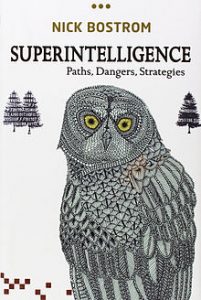The World of Tools and Landmines
Display Transcript
Digital transformation is a really key process to understand as we enter the ever approaching and ever-changing digital era. A really great resource for further understanding this information is the book Superintelligence by Nick Bostrom. This really great resource dives into a couple of concepts but all are primarily related to the concept of artificial intelligence; that being machine learning based in logic developed by human beings. Superintelligence, though, is a form of artificial intelligence that goes much further than those currently in existence. Superintelligence is a form of intelligence that humans not just create, but it exceeds humans own ability to interact, comprehend, solve problems, etc. So the super intelligence at its core is really just an intelligence that’s this much better than a human intelligence AI on the other hand then is just an intelligence that humans can make that is either inferior or equal to human intelligence at the time the reason this is a really key concept in the age of the digital era is that a super intelligence is something that many companies many individuals many researchers are striving for and it’s a really really hot topic the issue with that is if we have this sort of crucial tool that it can be really problematic if used in the wrong way for instance a super intelligence could be a phenomenal tool and resource to human be to human beings or a very powerful very horrific landmine in the path of the human race what I mean by this is a super intelligence that can’t be controlled that doesn’t have value structures and similar to human beings that doesn’t have a complex decision-making process can really hinder humans ability to proceed and live everyday life if it’s combating us along every step especially if it’s smarter than us on the other hand if we have a tool and a resource that’s incredibly agile that thinks as humans do that structures its decisions as humans structure and can be controlled by humans then humans have a very powerful tool to move forward with I think additionally the book touch some really crucial distinctions that people need to be ready for in a digital era primarily with the dichotomy between reactivity and proactivity on the one hand reactivity is incredibly important in a digital era we’re talking about a globalized commerce a globalized market place and change happens at the snap of a finger which means that things can go from the exact plan that we’re talking about to that technology being irrelevant in the span of minutes even seconds so we have to be able to react and change to an ever-changing process and technology that we’re working with however we also be proactive we have to think ahead we have to be able to plan and use our teams and teammates and co-creators to create visions that are not based specifically in the technology themselves that technology need tools and processes we use to achieve those visions because if the tools are changing we can still achieve the same mission with more efficient tools but i we’re making that technology really the core the really baseline understanding what we’re doing we never truly can achieve a higher level of reality we we are stuck in and absolutely capped by that technology level of technology that we’re using additionally then I think that the book really touches on the fact that humankind is going to be growing in the future digital era and while we can try to predict we can try to say what that will be like we don’t know for certain we can say that cultural significance the ability to interact with others and most importantly collaboration will be key as I referred to earlier a superintelligence can be either be a huge landmine or a great tool and the way that we can really strive to have it be a tool for humankind is to collaborate with one another we put egoism and selfishness aside for the monetary rewards that might come with developing that first super intelligence and instead work cohesively as a community as a he as a humankind as a race we can develop a super intelligence more succinctly as a group that follows the value structures and decision matrices that we’re really looking for as opposed to a singular perspective that can be really detrimental this sort of collaboration is also going to be key just generally in a digital era when we’re working by side with those who might not be physically next to us but across the country across the world so these are really important skills to to note and possible realities of our future and while nothing is for certain we can certainly say that there’s a level of understanding that we can have to what might be the future and with that in mind the book again superintelligence by author Nick Bostrom is a fantastic resource to get a grasp on this and i highly recommend the read
thank you

Superintelligence, by author Nick Bostrom, is a great tool for framing the importance of the topic of digital transformation. As he evaluates the potential of a reality in which artificial intelligence is superior to human intelligence, many of the considerations he examines are at the center of digital transformation itself. Adaptability, collaboration, and communication: these are topics that will be the vocabulary of the most success companies/industries in a digital era. They also happen to be key themes of his book.
On a more personal note, this book strongly influenced my understanding of what the digital world is becoming. More importantly, it influenced my vision on how I must be in order to operate in this digitized age. Primarily, my peers and I must learn to prioritize proactive planning. In order to stay ahead of a very reactive and ever-changing market and climate, creatively envisioning the future is what will propel future leaders to the forefront. For example, that could mean building a 5 year plan that imagines a new technological foundation instead of building off of the states quo. That is one insight, among many others, I constructed after reading Superintelligence, and highly recommend it to our readers.

Bradley Marshall
Member of Cohort 7 of the Lockheed Martin Leadership Institute
View Biography
Bradley Marshall is a junior Chemical Engineering major with an Energy co-major at Miami University. After graduation, he hopes to move onto law school to study intellectual property and patent law. Expected to graduate in May of 2020, he has served the Miami community in a variety of ways throughout his undergraduate years. A member of the Honors Program, Scholar Leader community, and the Lockheed Martin Leadership Institute, Brad focuses on high achievement and challenging himself inside and outside of the classroom. He has served as the President of the Renewable Energy club, an organization dedicated to hands on design work and peer teaching. He also is a Founding Father of the Alpha Chapter of Beta Theta Pi on campus, where he has served as Risk Manager. In his time at Miami, he has served the greater Greek community as the Interfraternity Council Vice President of Member Education, and during his term he created initiatives that centered on accountability, student safety, and redesigning a sustainable future for Greek Life. In his free time, Brad is an avid soccer player, reader, and enjoys random trivia facts.
Within the Lockheed Martin Leadership Institute, Brad serves as the team lead for the Writing and Documentation team. His personal research in the field of Digital Transformation is centralized on Artificial Intelligence, and specifically work in the development of a Superintelligence. Aside from his personal work, he collaborates with his team in the development of content used to distribute the message of Digital Transformation. Additionally, he aids in the peer editing and compilation of group reports and Cohort essays. This furthers his goals beyond graduation, and helps him practice the skills he hopes to use on a daily basis in the workplace. His interest in energy, as well as engineering, drives his interest in regulation and intellectual property law, and he hopes to apply this education to a role in an intellectual property firm or in a role within business consultancy. His drive to be a servant leader and solve problems furthers his passion to pursue these industries. He is committed to continual improvement, service to his community, and finding new opportunities to better himself.
